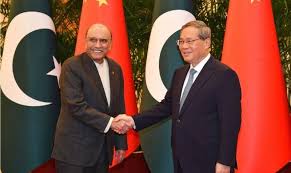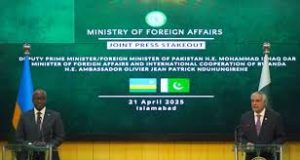“Escalation and Diplomacy: Navigating the Fallout from the Assassination of Hamas Leader Ismail Haniyeh”

Prof. Hafeez Ullah Khan
Political Analyst & Chairman GLOPRI
op-ed@hafeezkhan.com
On July 31, Ismail Haniyeh, a high-ranking Hamas leader residing in Qatar, was killed in Tehran while attending the inauguration of Iran’s new president. This incident, occurring on Iranian territory, is being scrutinized from various angles. One perspective highlights the significant embarrassment it represents for the Islamic Republic. Haniyeh was killed in Iran, where he was staying in a government-provided residence for the inauguration of President Massoud Pezeshkian. Tehran is a key supporter of Hamas, providing substantial financial and military support to the organization. Tehran’s immediate response to the assassination was to blame Israel and then to vow repercussions. Supreme Leader Ayatollah Ali Khamenei and a Revolutionary Guards commander both declared that Haniyeh’s death would not go unpunished. A three-day mourning period was declared, a sign of respect usually reserved for high-ranking officials or prominent individuals. However, Haniyeh will be buried in Qatar, where he had been living and where he traveled from to attend Pezeshkian’s inauguration. The Israeli government, likely responsible for Haniyeh’s killing (as well as Hezbollah’s military chief), appears to be in a strategy of “escalate to de-escalate.” By demonstrating its military strength and resolve, Israel aims to deter its adversaries from challenging it further, potentially leading to a favorable negotiated outcome with Hamas and Hezbollah. Israel views its conflict with Iran and its proxies as a crucial, long-term struggle, which has been ongoing for two decades. This conflict involves efforts by Iran to undermine regional stability and establish dominance through proxy groups and armaments, including nuclear and missile programs. Israel’s focus is on achieving a decisive victory that would weaken Iran’s influence and reduce its vulnerability to future threats. Thus, while Israeli Prime Minister Netanyahu seeks a ceasefire with Gaza, it is contingent on conditions that would hinder Hamas’s ability to regain control and threaten Israel. The same approach applies to negotiations with Hezbollah. Israel believes its military strength gives it an advantage and seeks to leverage this for both tactical and strategic gains, aiming for outcomes that favor it over a prolonged conflict or significant defeat, as Hamas currently faces.
The armed faction of Hamas declared that the assassination would “escalate the conflict and lead to significant consequences.” While visiting Singapore, Secretary of State Antony Blinken committed to ending the ongoing conflict and securing the release of hostages, including some Americans. Blinken and Defense Secretary Lloyd Austin III made numerous calls to Arab and Israeli leaders, striving to maintain diplomatic efforts and encourage restraint. However, the chances of controlling the violence seemed slim. Ayatollah Khamenei asserted that Iran must retaliate for Haniyeh’s death and cautioned Israel about facing severe consequences. Iran has military allies in Lebanon, Syria, Iraq, and Yemen, all of which have long vowed to oppose Israel’s existence and have attempted attacks since the conflict in Gaza began on October 7, 2023. Initially, the US urged all parties to exercise restraint. Blinken emphasized that the goal was to prevent the Gaza conflict from spreading and escalating. The immediate objective was to de-escalate tensions, though this also seemed unlikely.
Khamenei claimed that the US shares responsibility for the attack due to its long-standing military support for Israel. Blinken denied any prior knowledge or involvement in the assassination. The timing of the attack disrupted the new Iranian president’s plans, who had campaigned for increased Western engagement and was set to address the UN General Assembly in September—a platform Iran has used to discuss its nuclear program and diplomatic initiatives. Israel first targeted the Houthis at Hodeidah port in Yemen, followed by an attack on Hezbollah’s top commander Fouad Shukr in Beirut. The killing of Hamas leader Ismail Haniyeh in Tehran occurred shortly after. This series of high-profile attacks on Iran and its allies, starting in early 2024, represents a significant escalation. While these actions may boost Israel’s standing temporarily and enhance Netanyahu’s popularity, they do not alter regional dynamics, advance US interests, or enhance Israeli security. The Middle East faces a potential new cycle of conflicts, necessitating US leadership to maintain stability. The timing of Haniyeh’s assassination also has broader implications. It undermined President Pezeshkian, who was advocating for dialogue with the US on the day of his inauguration. Additionally, China had recently facilitated a Fatah-Hamas unity agreement as preparations for post-ceasefire Gaza were underway. Haniyeh was the leading candidate to head any new government in Gaza, but given the current turmoil, Hamas may appoint a temporary leader, such as Khaled Meshaal or Moussa Abu Marzouk, in his place.
The recent assassination follows shortly after Netanyahu’s trip to Washington, and there is widespread regional belief that such operations by Israel would likely have required US backing, as noted by US Defense Secretary Lloyd Austin. With President Joe Biden no longer a candidate for re-election, his administration can act without the constraints of electoral considerations or criticism from the Democratic Party’s left-wing (the US has denied any foreknowledge of the attack). Additionally, the Israeli government has become more radicalized following cabinet changes last June, making it more willing to engage in high-risk actions. What comes next? A retaliatory response seems inevitable, whether soon or later. With Iran now directly involved, a broader regional retaliation is anticipated. Both Israel and Iran are keen to avoid direct conflict while navigating deterrence and engagement rules. If the US does not take a leading role, as it did following Israeli strikes on the Iranian consulate near Damascus last April, the potential for miscalculations increases significantly. The Biden administration should exert pressure to moderate both Israel and Iran, advocate for an immediate ceasefire in Gaza, and maintain indirect communication channels with the Iranian regime as necessary.
The views and opinions expressed are those of the writer and do not necessarily reflect the views or positions of the organisation.





